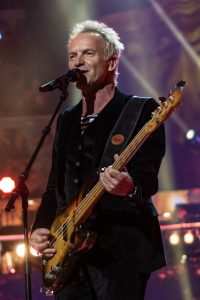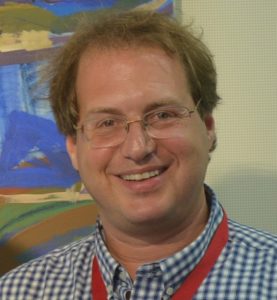
Image: Raph_PH [CC BY (https://creativecommons.org/licenses/by/2.0)]
Written by guest blogger Evyatar Marienberg.
I grew up in a religious community, went to religious schools, and have been associated with a religious group for more or less the first three decades of my existence. Sting, legally known as Gordon Matthew Sumner, had a similar experience, even if his association with a religious group was slightly shorter. He was born two decades before I was. He was born in the UK. I was born in Israel. The religious community he was raised in was Catholic. The religious community I was raised in was a part of Modern Orthodox Judaism. We are very different people, with very different bank accounts, Facebook accounts, and houses, to name just a few differences. What is true for both of us, and for countless other humans, is that a religious upbringing left strong marks on us, apparent even after we lost our faith and left the religious communities we were raised in.
We are all influenced, in different ways, by popular culture. Our popular culture is influenced, in different ways, by religion. What occurs when those among us who are not only influenced by, but actually contribute much to, the popular culture around us, have religion influence them as well? This result is of particular interest for me, and for many of those writing for this journal.
I became fascinated with Sting’s music, especially his lyrics, during high school when he released his second solo album, … Nothing Like the Sun, in 1987. It was not the reason for my liking of his music, but I did notice a prominence of religious themes in his lyrics. I filed this knowledge away in some drawer in my brain. I became a historian despite the fact that in another song from that same album, Sting sang that “history will teach us nothing.” I published books, I published articles, and I got a good academic job. At some point, I said to myself, and possibly to others, that one day, maybe after I retire, I would write an article about how Sting uses religion in his lyrics. As it happened, a colleague said one day: “Don’t wait. Do it now.”
Well, why exactly I do not know, but I indeed decided to take this suggestion seriously. And not to write only an article, but to aim for a much bigger project. Having contemporary Catholicism as one of my main fields of interest, I quickly realized that Sting represents the type of Catholics I am most interested in: those who were born about a decade before the Second Council of the Vatican (a meeting of the world’s Catholic bishops from 1962 to 1965), which brought huge changes to Catholicism. These Catholics experienced pre-council Catholicism, during-council Catholicism, and post-council Catholicism. Sting was born in 1951. He spent his first 11 years before the council, and experienced pre-council Catholicism at his Catholic school, and in his parish. He then experienced the way things changed while attending (Catholic, of course) Grammar School. When he stopped going to church on a regular basis, during the first half of the 1970s, the Catholic Church was already a very different one than the one he grew up in.
My recent article in the Journal of Religion and Popular Culture,
“…O My God: Religion in Sting’s Early Lyrics,” tries to explore religious notions in Sting’s early work, from 1975, when he began performing with the band Last Exit, and later the internationally famous The Police, and until the moment he began a solo career in 1984. In other publications I discussed religion in some of his later work. I hope to soon publish, in a different format, my findings about the religion of his childhood.

Dr. Evyatar Marienberg is a historian of religions, with a particular focus on the study of beliefs and practices of lay Jews and Christians from various periods. Born in Israel, he studied in Israel, Paris, and New York, and taught or was a research fellow at McGill University, Tel Aviv University, the University of Notre Dame, the Jewish Theological Seminary in New York, and Harvard University, among other places. He is a member of the Department of Religious Studies at the University of North Carolina at Chapel Hill, where he is an associate professor.
His latest article in The Journal of Religion and Popular Culture entitled “O My God: Religion in Sting’s Early Lyrics” is free to read for a limited time here.
The UTP Journals blog features guest posts from our authors. The opinions expressed in these posts may not necessarily represent those of UTP Journals and their clients.
Comments on this entry are closed.